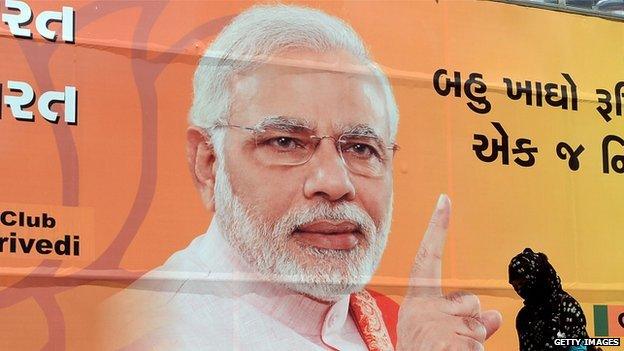Viewpoints: How will Modi affect US-India relations?
- Published

The election of Narendra Modi poses opportunities - and challenges - for the US-India relationship
Narendra Modi hails a "landmark" victory for his BJP party. Experts on US-India relations now predict big changes for how the two nations will get along.
Mr Modi has been a controversial figure in India and the US. Critics say he did little to stop the 2002 riots in Gujarat, in which at least 1,000 people died. He has denied these allegations, and he was never charged with wrongdoing.
The US denied him visas, however, and he became an international pariah.
As prime minister, he will be working closely with US officials. Here experts look at the implications of his election for the relationship between the US and India.

Doing business with Mr Modi
The Obama administration must send a clear signal that it is ready to do business with Mr Modi and that it will not give him the cold shoulder over the issue of the Gujarat riots.
Mr Modi stayed away from communal politics and focused instead on the economy and good governance during the election campaign. Moreover, the sheer scale of the BJP win gives him a strong mandate.
New Delhi and Washington share strategic objectives, whether it involves fighting terrorism, maintaining open seaways or hedging against China's rise. Specifically, the BJP's interest in adopting a more assertive hedging strategy regarding China will give US officials a chance to engage closely with them.
A more assertive Indian foreign policy could pose challenges to the US, however.
Prime Minister Manmohan Singh's commitment to maintaining peaceful ties with Islamabad, despite attacks in India over the last several years that were often traced back to Pakistan-based groups, has kept bilateral ties in check. There are indications a BJP-led government would be less patient with Pakistan.
-Lisa Curtis, Heritage Foundation

A new relationship with India
The Obama administration has no choice but to engage Mr Modi as the democratically elected leader of India. This kind of decision is not unprecedented. One only has to look next door to Pakistan to understand the ability of the US to support individuals in power despite of their unsavoury pasts.
Indeed the Indian elections offer the US a chance of a fresh start for the stalled India policy of the Obama administration.
US officials have faced significant obstacles with India in the past, ranging from disagreements over issues such as Libya, Crimea and Iran to an overly protectionist economic environment in India that dampened hopes of US businesses.
US officials now have a chance to develop a new relationship with India - and to change the playing field.
-Shamila Chaudhary, Johns Hopkins University

Overcoming resentment
A range of differences has dogged the two nations. These include the arrest of an Indian diplomat, Devyani Khaobragade, in New York for her failure to pay adequate wages to a maid to issues of intellectual property pertaining to India's pharmaceutical industry.
Even worse, the US ambassador to India resigned in April, and the Obama administration has yet to appoint a replacement. Indeed the relationship seems to have lost much of the steam that it had during Mr Obama's visit to the country in 2010.
In addition any attempt to strengthen ties will need to overcome another hurdle - Mr Modi's resentment about the US decision to deny him a visa in 2005. Still Mr Modi is a pragmatist.
He has made it clear that he is intent on restoring economic growth, providing employment opportunities and providing good governance. If he wishes to remain true to these goals, he will need to find ways to work with the US.
-Sumit Ganguly, Indiana University, Bloomington

Business relations hold the two nations together
US officials have avoided Mr Modi for the past decade, but nevertheless business relations have held the US and India together.
He is likely to focus his attention on increasing economic growth. This bodes well for business leaders in India, many of whom have withheld investments in recent years because they felt under attack by the government. Now they are more likely to invest.
Government ties between the US and India are likely to strengthen because of these reasons. In addition Mr Modi's party has historically engaged in a robust foreign policy and the strategic interests of both countries are well-aligned.
With his focus on economic development and their common strategic interests, Mr Modi has a foundation for success in his dealings with US officials.
-Richard Rossow, Center for Strategic and International Studies